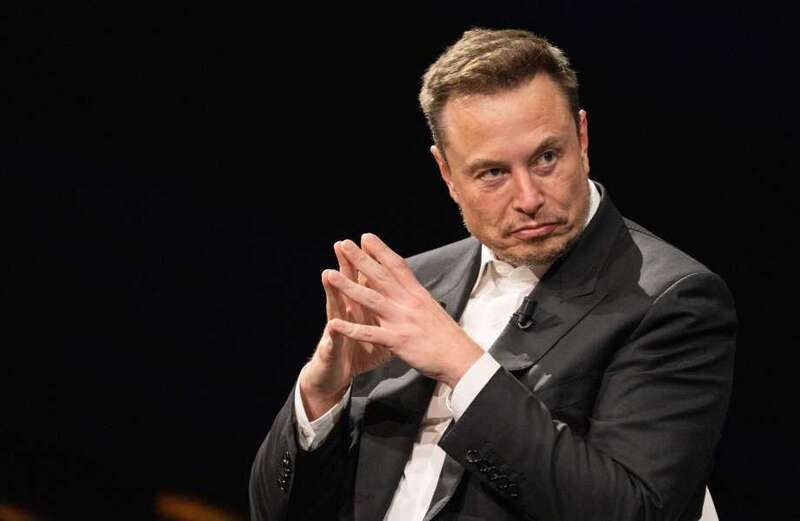ELON Musk has divided fans after announcing that his controversial Neuralink brain chip has been implanted in a human.
The Neuralink tech aims to enable someone to control their phone or another device with their mind, according to Musk.



"The first human received an implant from @Neuralink yesterday and is recovering well," Musk wrote on Monday on X, formerly known as Twitter.
"Initial results show promising neuron spike detection."
The Tesla boss followed the huge news by explaining how the technology works.
 Elon Musk makes history by becoming the first person in the world to lose $200bn
Elon Musk makes history by becoming the first person in the world to lose $200bn
He said that the first Neuralink product is called Telepathy.
"Enables control of your phone or computer, and through them almost any device, just by thinking," he wrote.
"Initial users will be those who have lost the use of their limbs.
"Imagine if Stephen Hawking could communicate faster than a speed typist or auctioneer. That is the goal."
The company previously said that the Neuralink mission is to restore autonomy to individuals who have "unmet medical needs," with a vision to "unlock human potential" in the future.
Neuralink got FDA clearance for its first human clinical trials in May, with the company initially wanting to test on 10 humans, though that number has since changed to six.
The brain chip has 1,000 electrodes and hopes to help people wirelessly perform computer functions simply by thinking via a “think-and-click” mechanism.
Neuralink, a start-up founded by Musk in 2016, said in November that it was looking for quadriplegics under 40 years old to take part in the human trials.
FINAL FRONTIERS?
People had split reactions to the news, with some seeing the advancement as foreboding and others viewing it as hopeful.
 Taiwan reveals Elon Musk-style plot to resist China using 'army of satellites'
Taiwan reveals Elon Musk-style plot to resist China using 'army of satellites'
"The negative potential of this makes me very uneasy," one person wrote in a reply on Musk's X post.
"I'm terrified by the thought of it," said another.
Someone else replied, "Elon can turn off this fear with a chip in your brain."
"Matrix time," another said, referencing the iconic dystopian movie.
"The first cyborg has been born," a fifth said.
Others, meanwhile, were astounded by the advancement and shared their excitement about seeing the results.
"Well done Neuralink and Elon!! This might very well turn out to be an important moment in history," wrote one user.
"This is awesome news, we’re expanding on the two final frontiers. Space and the mind, can’t wait for the next company talk. So excited!" another said.
Some were thirsty for more information on the human trial development.
"This is crazy, holy c**p. I can't wait to get more info. Can you share more about what you're treating?" asked a follower.
"I was wondering about the neuron spikes. Good to hear," wrote another.
Neuralink wrote in May, when it received FDA approval for human trials, "This is the result of incredible work by the Neuralink team in close collaboration with the FDA and represents an important first step that will one day allow our technology to help many people."
In a speech at the company headquarters in December, Musk addressed concerns and his plan for caution moving forward.
"We want to be extremely careful and certain that it will work before putting a device into a human," he said.
"The progress at first, particularly as it applies to humans, will seem perhaps agonizingly slow, but we are doing all of the things to bring it to scale in parallel."
Neuralink announced its search for human test subject on November 21 via X with a short video detailing what the "PRIME" study would entail.
Standing for "Precise Robotically IMplanted brain-computer InterfacE," the study asked for people "living with quadriplegia due to spinal cord injury or amyotrophic lateral sclerosis (ALS)," to consider being the first to receive the implant.
CONTROVERSIAL TESTING
In April 2021, Neuralink shocked the world with video of a Macaque, known as Pager, with one of the chips playing Pong.
The animal was seen using a joystick manually and then operating it with only its mind via a wireless connection with the chip.
Neuralink reportedly implanted Bluetooth-enabled chips into the brains of several monkeys to see if they could communicate with computers through a small receiver.
Some of the test subjects are believed to have "suffered infections from the implanted electrodes placed in their brains," according to a complaint filed by The Physicians Committee for Responsible Medicine (PCRM).
The group filed a complaint with the USDA, claiming it had evidence macaques used in previous trials were subjected to horrific suffering.
In 2022, the USDA opened a federal probe under the Animal Welfare Act, Reuters reported.
About 1,500 animals - including more than 280 sheep, pigs, and monkeys - reportedly died as a result of Neuralink tests since 2018, the outlet reported, citing records it reviewed.
The company was accused of subjecting animals to "extreme suffering" - with one monkey having holes drilled in its skull.
Experiments allegedly left 15 out of 23 monkeys dead.
In one instance, a monkey was found missing some fingers and toes, possibly caused by self-mutilation, legal papers claimed.
Another case revealed a female macaque monkey had electrodes implanted into its brain, which caused it to be overcome with vomiting, retching, and gasping.
An autopsy later showed the monkey suffered from a brain hemorrhage.
Bloody skin infections, monkeys collapsing, and other horrific side effects were also recorded in the results, according to court papers.
Neuralink conducted its monkey experiments in partnership with scientists at the University of California, Davis.
"No monkey has died as a result of a Neuralink implant. First, our early implants, to minimize risk to healthy monkeys, we chose terminal monkeys (sic) (close to death already)," Musk replied to a meme on X.






































